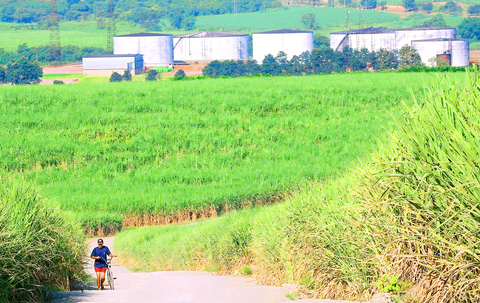Just an hour's drive outside this traffic-choked metropolis where US President George W. Bush will kick off a Latin American tour on Thursday, sugarcane fields stretch for hundreds of kilometers, providing the ethanol that fuels eight out of every 10 new Brazilian cars.
In only a few years, Brazil has turned itself into the planet's undisputed renewable energy leader and the highlight of Bush's visit is expected to be a new ethanol "alliance" he will forge with Brazilian President Luiz Inacio Lula da Silva.
The deal is still being negotiated, but the two leaders are expected to sign an accord on Friday to develop standards to help turn ethanol into an internationally traded commodity, and to promote sugar cane-based ethanol production in Central America and the Caribbean to meet rising international demand.

PHOTO: AP
Across Latin America's largest country, Brazilian media were billing the Bush-Silva meeting as a bid to create a new two-state"OPEC of ethanol," despite efforts by Brazilian and US officials to downplay the label amid concerns that whatever emerges would be viewed as a price-fixing cartel.
Meanwhile, political and energy analysts warned that any agreements reached between Brazil and the US were unlikely to have short-term effects.
And the deal itself could end up largely symbolic because of reluctance by Washington to address a key point of friction: a US$0.14 per-liter US tariff on Brazilian ethanol imports.
"For the Brazilians, the tariff has utmost priority," said Cristoph Berg, an ethanol analyst with German commodities research firm F.O. Licht.
"They will agree with developing biofuel economies around the world, but the first thing they will say is `We want to do away with that tariff," he said.
But no one is expecting Bush to give ground on the tariff.
The politically sensitive issue essentially subsidizes US corn growers who are rapidly ramping up ethanol production amid Washington's encouragement of renewable biofuels to ease US dependence on imported petroleum.
But the visit will help Bush and Lula join forces to promote the politically popular issue of renewable energy simply by gathering in a place where ethanol is king.
At every gas station in the city of 18 million, drivers can fill up with gasoline or ethanol. Ethanol came courtesy of a 1970s decision by former military dictators to subsidize production and require distribution at the pumps.
A 1980s Brazilian fad with cars that ran only on ethanol petered out when oil prices fell in the early 1990s.
But the fuel came back into vogue in 2003 when automakers started rolling out "flex-fuel" cars that run on gasoline, ethanol or any combination of the two.
With international oil prices reaching record highs, Brazilian drivers turned to the cars; most choose ethanol, because it costs about half as much as gas.
The ethanol industry is now making profits like never before amid heavy foreign investment.
Brazil is the world's top exporter, though US ethanol production still surpasses Brazil. Brazil, however, produces it more cheaply.

AGING: As of last month, people aged 65 or older accounted for 20.06 percent of the total population and the number of couples who got married fell by 18,685 from 2024 Taiwan has surpassed South Korea as the country least willing to have children, with an annual crude birthrate of 4.62 per 1,000 people, Ministry of the Interior data showed yesterday. The nation was previously ranked the second-lowest country in terms of total fertility rate, or the average number of children a woman has in her lifetime. However, South Korea’s fertility rate began to recover from 2023, with total fertility rate rising from 0.72 and estimated to reach 0.82 to 0.85 by last year, and the crude birthrate projected at 6.7 per 1,000 people. Japan’s crude birthrate was projected to fall below six,

US President Donald Trump in an interview with the New York Times published on Thursday said that “it’s up to” Chinese President Xi Jinping (習近平) what China does on Taiwan, but that he would be “very unhappy” with a change in the “status quo.” “He [Xi] considers it to be a part of China, and that’s up to him what he’s going to be doing, but I’ve expressed to him that I would be very unhappy if he did that, and I don’t think he’ll do that. I hope he doesn’t do that,” Trump said. Trump made the comments in the context

SELF-DEFENSE: Tokyo has accelerated its spending goal and its defense minister said the nation needs to discuss whether it should develop nuclear-powered submarines China is ramping up objections to what it sees as Japan’s desire to acquire nuclear weapons, despite Tokyo’s longstanding renunciation of such arms, deepening another fissure in the two neighbors’ increasingly tense ties. In what appears to be a concerted effort, China’s foreign and defense ministries issued statements on Thursday condemning alleged remilitarism efforts by Tokyo. The remarks came as two of the country’s top think tanks jointly issued a 29-page report framing actions by “right-wing forces” in Japan as posing a “serious threat” to world peace. While that report did not define “right-wing forces,” the Chinese Ministry of Foreign Affairs was

PREPAREDNESS: Given the difficulty of importing ammunition during wartime, the Ministry of National Defense said it would prioritize ‘coproduction’ partnerships A newly formed unit of the Marine Corps tasked with land-based security operations has recently replaced its aging, domestically produced rifles with more advanced, US-made M4A1 rifles, a source said yesterday. The unnamed source familiar with the matter said the First Security Battalion of the Marine Corps’ Air Defense and Base Guard Group has replaced its older T65K2 rifles, which have been in service since the late 1980s, with the newly received M4A1s. The source did not say exactly when the upgrade took place or how many M4A1s were issued to the battalion. The confirmation came after Chinese-language media reported